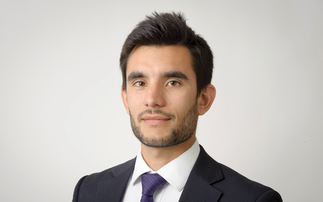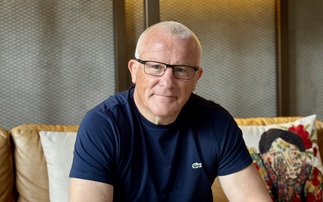Jupiter's new CEO Maarten Slendebroek talks about fund pricing, taking over from Edward Bonham Carter, and what the future holds for the group.
Having taken over from Edward Bonham Carter as chief executive of Jupiter Asset Management in March, Maarten Slendebroek has a task on his hands. Bonham Carter is one of the most recognisable names in the fund management industry, and his success during his seven years in charge means he could be a hard act to follow.
But the new chief executive is relatively relaxed about the job ahead of him. He points out his previous role, as head of international retail at BlackRock, saw him responsible for assets well in excess of Jupiter’s £31.7bn.
He acknowledges, however, that CEO of a FTSE 250-listed company is a much “more visible” role than those he has held in the past.
For now, the focus is on Slendebroek and Bonham Carter working in tandem to achieve those aims. Now vice chairman, Bonham Carter remains on the company board, working four days a week in close contact with ‘key stakeholders’ that include clients and regulators. Slendebroek hopes the current set-up will remain in place for some time.
“I will be very disappointed if he exits in a year’s time,” he said.
“If we had a larger senior team it would be easier, but we have a narrow senior team. I want to make it attractive for him to work here.”
Ensuring continuity of leadership is important to a business that is embarking on what it hopes is a new phase of expansion. An established name in the UK retail market, Jupiter now has ambitions to expand both internationally and institutionally.
The new CEO is keen to emphasise the plan will not involve neglecting the UK IFA market, to which, he says, the company is trying to provide “better and better” service.
Jupiter already punches above its weight in the retail arena – according to the IMA, it is the sixth largest provider in the space, outflanking many global companies, and Slendebroek sees an opportunity to translate that overseas.
“We already have the UK business of the largest global institutions, and are now looking to work with them internationally,” he said.
This also ties in to Jupiter’s desire to do more with wealth managers and private banks: the need to “follow the client around the world” is paramount, according to the CEO.
Jupiter’s ambitions in this regard may also have been helped by the disposal of its own £2.2bn private client business, which it agreed to sell to Rathbones earlier this year.
“We were a small player [in that industry] and it is a good home for our clients. It also takes away any idea we may be competing with our best clients, though I do not think this was the case anyway,” Slendebroek said.
Changing of the guard
There has also been a changing of the guard among other top personnel at Jupiter: After the three-year lock-up period that followed its 2010 flotation expired last summer, Jupiter has seen a couple of high profile departures: Tony Nutt and Philip Gibbs have both retired in the last 18 months.
Gibbs created some uncomfortable press for Jupiter last month when he used the annual shareholder meeting to attack the group for its treatment of him in his final years at the company.
Gibbs said he was “shocked” at the critical treatment he received when running the underperforming Absolute Return fund, suggesting he should have been given more leeway considering his earlier record on the successful Financial Opportunities fund.
With typical understatement, Slendebroek acknowledged the AGM went “less smoothly than hoped”, but declined to be drawn further on the subject of the former manager.
He is, however, happy to hold forth on one subject of Gibbs’ ire: chief investment officer John Chatfeild-Roberts. The former financials manager said Chatfeild-Roberts should relinquish his CIO role to focus on running money, but Slendebroek said both he and the head of the Merlin multi-manager team are comfortable with the current arrangements.
Slendebroek also noted the support given to Chatfeild-Roberts for both responsibilities: not just the broader Merlin team of Algy Smith-Maxwell, Peter Lawery and Amanda Sillars, but also Stephen Pearson, when it comes to helping manage Jupiter’s investment teams.
Pearson, previously deputy CIO, joined Jupiter in 2001 as a fund manager and was quietly promoted to head of investments at the end of 2013.
Nonetheless, Chatfeild-Roberts is clearly an integral part of the business, not least because his team runs around a third of Jupiter’s total asset base. Four years on from the IPO that provided a windfall to many long-serving staff members, is there a risk he will be tempted to retire?
Slendebroek understands there will always be those who take the opportunity to move on, but he is confident the CIO is committed to the group for the long term.
“There will always be people who make good money and then check out, and that is fine. What is important is having the conversation with staff and finding out how motivated they are.
“I would say John is one of the most motivated here. I will do everything possible to incentivise him and his team to stay for many more years, and you can measure my success at that by how long he does stay.”
Fund range
In the nearer term, investors’ concerns may centre on the performance of the Jupiter Merlin range, which has struggled over the past year.
Slendebroek said there are signs the team is “back on form” after a 2013 in which the funds fell into the third and fourth quartiles of the performance charts. The flagship Merlin Income fund has seen an uptick this year, but others in the range remain below their sector averages over this timeframe.
The chief executive described Chatfeild-Roberts as his own harshest critic, and said rolling three-year returns are the metric by which performance should be judged: not just for managers, but for his own role at the top.
Looking more broadly across Jupiter’s fund management personnel, Slendebroek said small but focused investment teams, rather than individual managers, will enable Jupiter to build its business on firmer foundations. But he acknowledged this cannot be used as an excuse.
“Populating teams makes the business more scalable. I do not like star culture, but I do like personal accountability.”
The hire of Ross Teverson, for example, who will join the firm from Standard Life Investments in November as head of strategy for global emerging markets, shows how Slendebroek is keen to strengthen existing teams.












